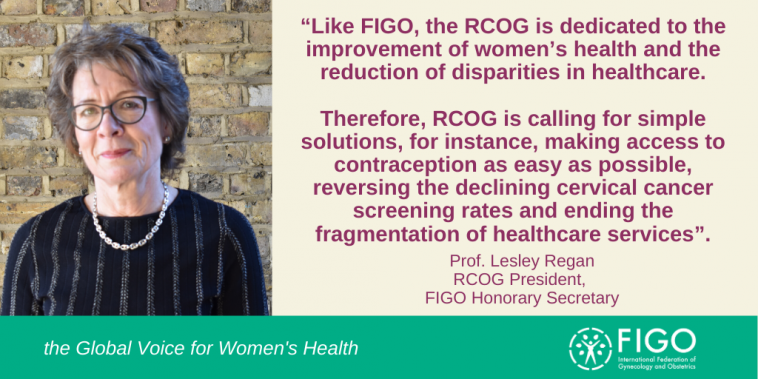Better for Women

FIGO National Member Society, The Royal College of Obstetricians and Gynaecologists (RCOG), has this week launched a “Better for Women” report, calling for better joined-up services through the UK’s Health Service.
The report aims to ensure that women’s health and wellbeing — not just their reproductive health during pregnancy — become priorities throughout their lives.
There are many variations in the quality and availability of services across the UK. Health services often miss opportunities to ask the right questions, optimise the resources available to prevent illness and ensure the best outcomes.
Lesley Regan, President, RCOG and FIGO Honorary Secretary highlights:
“Many of the barriers to access to women’s healthcare services can be improved by ensuring services are joined up and more responsive to the needs of girls and women. We must provide a comprehensive health service for girls and women throughout their lives. We want to empower 51% of the population to be as healthy as possible and ensure no one is left behind”.
Better for Women Report findings include:
- Nearly 4 in 10 women (37%) are unable to access contraception services, and 60% of women cannot access unplanned pregnancy services, including abortion care locally.
- Latest statistics show that abortions are at an all-time high and highlight the unmet contraceptive needs of women. In 2018, there were 200,608 abortions across England and Wales – an increase of 4% on the previous year.
- Over a third (34%) of women did not attend their last smear test, despite the cervical screening programme being able to prevent up to 70% of deaths from cervical cancer.
- Only half (50%) of women can access sexually transmitted infections (STI) services, and 56% of women are unable to seek help for menstrual health issues, such as for heavy/painful periods, locally.
- Just over half of women (58%) cannot access menopause services, despite almost every woman going through the menopause at some point in life.
- Poor access to basic women’s health services leads to a rise in unplanned pregnancies, abortions, poor patient experiences and outcomes, and increases damaging postcode lotteries across the country.
RCOG has identified simple and cost-effective solutions to prevent girls and women falling through the cracks of the UK’s health systems to reach those who are stuck in a vicious cycle of poor outcomes. Critically important because the evidence shows that healthy women are the cornerstone of healthy societies.
Lesley Regan, President, RCOG and FIGO Honorary Secretary continues:
“Like FIGO, the RCOG is dedicated to the improvement of women’s health and the reduction of disparities in healthcare. Therefore, RCOG is calling for simple solutions, for instance, making access to contraception as easy as possible, reversing the declining cervical cancer screening rates and ending the fragmentation of healthcare services”.
Primary recommendation - the creation of national Women’s Health Strategies that adopt a life course approach to women’s health – is the first important step towards ensuring better health for girls and women, now and in the future.
RCOG is calling for the creation of national strategies for women’s health based on a life course approach to address the following areas of unmet need:
- Access to reliable information on women’s health
- Easy access to contraception, abortion and fertility services
- Learning from indicators in the reproductive years to influence future health
- Violence against girls and women
- Prevention and early diagnoses of gynaecological cancers across the life course
- Keeping women in the workforce
This new approach would steer the UK away from providing a disease intervention service towards a preventative health service which addresses the determinants of health as well as significant causes of morbidity and mortality.
Better for women is a UK document. However, RCOG hopes that the learnings of the report can be used to improve the health and wellbeing of girls and women across the globe.